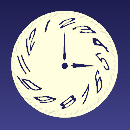

Dec 2020
In February 2020 CSD-N signed on to a letter urging Congress to support sleep community priorities, including the establishment of a new Chronic Disease Education and Awareness Program at the CDC (U.S. Centers for Disease Control and Prevention). Thanks to Julie Flygare at Project Sleep for circulating this letter.
As 2020 comes to a close, we are happy to report that the final FY21 Omnibus Bill that recently passed through the House and the Senate includes the new CDC Chronic Disease Education and Awareness Program (in Division H of the bill). Our advocacy worked!
"People living with sleep disorders often go years or decades without proper diagnoses," said Flygare. "Reducing these unacceptable delays-to-diagnosis is a huge priority for our organization and this new federal program is an important step to help people with under-recognized conditions find accurate diagnoses faster."
The new CDC Chronic Disease Education and Awareness program aims to expand public health education and awareness activities that help to improve surveillance, diagnosis, and proper treatment for chronic diseases. Congress included $1,500,000 in funding to establish a competitive grant program to expand and advance CDC's work with stakeholders on education, outreach, and public awareness activities for a variety of chronic diseases for which there is a clear disparity in public and professional awareness that are not already specified in the CDC's budget.
This approach would utilize a competitive grant process to strengthen the science base for prevention, education, and public health awareness for a variety of chronic diseases, such as sleep disorders, that do not currently have dedicated resources that would lead to meaningful patient outcomes.
Dec 2020
 The NIH (U.S. National Institutes of Health) Sleep Disorders Research Advisory Board (SDRAB) met in a Zoom session on Dec 3. Attending from CSD-N were past SDRAB member Susan Plawsky, whose term has expired; CSD-N board member Alexandra Wharton, who is applying for the vacant slot; newly elected CSD-N board member Andrew Cowen; CSD-N president Peter Mansbach; and possibly others.
The NIH (U.S. National Institutes of Health) Sleep Disorders Research Advisory Board (SDRAB) met in a Zoom session on Dec 3. Attending from CSD-N were past SDRAB member Susan Plawsky, whose term has expired; CSD-N board member Alexandra Wharton, who is applying for the vacant slot; newly elected CSD-N board member Andrew Cowen; CSD-N president Peter Mansbach; and possibly others.
Dr Marishka Brown has been appointed as the new director of the NIH National Center for Sleep Disorders Research (NCSDR). She replaces Dr Michael Twery, who held the post for many years. CSD-N wishes to thank Dr Twery for his support, including our successful efforts to get circadian rhythm sleep disorders listed on the NIH website. We look forward to working with Dr Brown, whom we know from previous meetings of the SDRAB.
NCSDR continues its efforts to get sleep acknowledged as the third fundamental pillar of health, in addition to nutrition and exercise. There were presentations illustrating the increase in sleep research in several areas. There was mention of the need to get students interested in sleep research earlier in their studies in order to increase the number of researchers.
The Sleep Disorders Research Plan, which the SDRAB has been working on for the past several years, is due out in 2021.
Andrew Cowen called in during the public comment period and gave a powerful statement on the need for more awareness of circadian rhythm sleep disorders, and better diagnosis.
Nov 2020
It's time to elect directors to the CSD-N Board of Directors. We have one new volunteer, Andrew Cowen, who has been nominated by the board. Four current board members are also running for re-election: James Fadden, Karen Martin, Lynn McGovern, and Alexandra Wharton. Four other directors have terms which don't expire until next year.
Candidate statements will appear in the upcoming newsletter, which will also be posted online for members.
The board has also voted to expand to 9 directors. So we have 5 candidates for 5 open slots. Since they will all be elected, the board has voted to dispense with the formal balloting by the membership.
Per the Bylaws, the new director takes office Jan 15.
Nov 2020
From the U.S. National Institutes of Health: "Rare disease patients and caregivers: How are you being impacted by the novel coronavirus pandemic? Please complete a 20-minute online research survey from home to share your experiences. This study is being conducted by the NIH's Rare Diseases Clinical Research Network (RDCRN). Your responses may help researchers understand the impacts of COVID-19 on the rare disease community. Survey closes Dec 15. Complete the survey or learn more at https://RareDiseasesNetwork.org/COVIDsurvey."
(US residents only)
Nov 2020
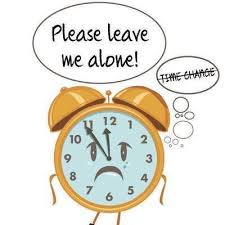 Daylight saving time: an American Academy of Sleep Medicine position statement . AASM (American Academy of Sleep Medicine) argues for not switching twice a year, and why year-round standard time is better than year-round daylight saving.
Daylight saving time: an American Academy of Sleep Medicine position statement . AASM (American Academy of Sleep Medicine) argues for not switching twice a year, and why year-round standard time is better than year-round daylight saving.
"DST is less well-aligned with intrinsic human circadian physiology, and it disrupts the natural seasonal adjustment of the human clock due to the effect of late-evening light on the circadian rhythm. DST results in more darkness in the morning hours, and more light in the evening hours. Both early morning darkness and light in the evening have a similar effect on circadian phase, causing the endogenous rhythm to shift to later in the day. There is evidence that the body clock does not adjust to DST even after several months. Permanent DST could therefore result in permanent phase delay...."
SRBR (Society for Research on Biological Rhythms) agrees: Why we should let the sun set on Daylight Saving Time. "People living on the western edges of time zones provide a stark example of how a small difference in the relationship between the timing of sunrise-sunset and clock time can affect population health. Individuals who live on the westward side of a time zone, where there is more sunlight in the evening, have a higher risk of poor health and shorter life expectancy compared to those who live on the eastern edge of a time zone, where the sun rises and sets earlier relative to the clock time."
For DSPD people it's a little easier to make a 2:00pm appointment on standard time. And light late in the evening in summer tends to delay one's schedule even later. But some dislike the early winter darkness.
Oct 2020
A small change in a key component of our biological clocks lengthens the clock period, causing people to stay up late at night and sleep late in the morning.
Read more in the news article, Scientists discover how a common mutation leads to 'night owl' sleep disorder (non-technical).
 Oct 2020
Oct 2020
Julie Flygare and Project Sleep organized a virtual "Sleep Advocacy Day" forum spanning Oct 5 and 6. Circadian Sleep Disorders Network was to be represented by Jason Myatt and Lynn McGovern on Oct 5, and by Jason and Alexandra Wharton on the 6th. Unfortunately Jason was ill and could not attend.
Lynn reported on the talks presented the first day:
On the 5th of October, 2020, I attended the first day of the Sleep Advocacy Forum. The forum was very interesting, and this article will briefly cover some of the day's talks.Alexandra reported on the second day, which was mostly discussions:The first talk was by Dr Janet He from the National Institute of Neurological Disorders and Stroke. Dr He's research focuses on sleep and circadian disorders. She spoke about medical trials and the particularly expensive nature of human trials. Dr He also spoke about funding streams for research.
Dr Kiley from the National Heart, Lung, and Blood Institute at the National Institutes of Health gave a fascinating talk on the relationship between sleep fragmentation, a healthy sleep score (which is a measure of sleep quality, sleep duration, and sleep schedule), and cardiac risk factors. In particular, he spoke about research that has demonstrated that high levels of sleep fragmentation and low sleep scores increase the risk of coronary heart disease. Interestingly, a good sleep score has been shown to modify risk in those who are genetically susceptible to cardiovascular disease.
Dr Kiley also spoke about how untreated sleep apnea is associated with a 70% increased risk for death in COVID-19 patients. Conversely, CPAP usage within the last year is associated with a lower risk of death.
Next up was medical advisor to CSD-N, Dr Phyllis Zee. Unsurprisingly, her talk was very relevant to our organisation. She spoke about her work as an advocate with the Society for Research on Biological Rhythms. Her talk covered the effect of altered circadian rhythms on Alzheimer's disease, cancer, insulin resistance, and diabetes. She also emphasized that circadian rhythm disorders are not as rare as we think. Unfortunately, Dr Zee had to leave after her talk, so I couldn't probe this issue further. I have personally long suspected that mild DSPD is much more common than is believed.
Another great talk was given by Dr Michael Grandner. He stated that sleep quality is affected by: "When we sleep, where we sleep, and with whom we sleep." Sleep quality does not stand alone, as it is embedded within one's overall life and place in society. His talk focused on the relationship between insufficient sleep/sleep disorders and minority status. The very first research paper on this issue was only published in 2000, so it's a relatively new area of research. He quoted Hale and Do's (2007) research that found that black people are more likely to be short/long sleepers. He also spoke about emerging research on this topic. Finally, Dr Grandner spoke about the very disturbing research which demonstrated that adverse childhood experiences (ACEs) can affect sleep for up to 50 years after the events.
Dr Ewart from the American Thoracic Society spoke next. His talk covered issues with Medicare's distribution of CPAPs. Specifically, Medicare will only cover a particular supplier and will withdraw payment for the CPAP if it is not used a minimum amount of times per billing period. They also monitor such devices remotely, and as such are the only medical device that is routinely monitored in this way.
Dr Malhotra spoke about his work with AASM. He posited that COVID-19 is currently the greatest challenge facing sleep medicine. The first problem is that many sleep centres are closed, and the second problem is that many patients do not wish to come to those that do remain open to patients. He echoed Dr Ewart's concerns about CPAP access. He also spoke about AASM's advocacy work. In particular, AASM currently advocate for: for the elimination of daylight saving time, state legislation to move school start times later in the mornings, and the decrease of sleep health disparities.
The day ended with a series of short talks by the various patient groups attending the Sleep Advocacy Forum.
The Sleep Advocacy Forum was excellent with 70+ attendees. I had the opportunity to represent us and speak about CRDs on the second day during the community intro and breakout sessions.
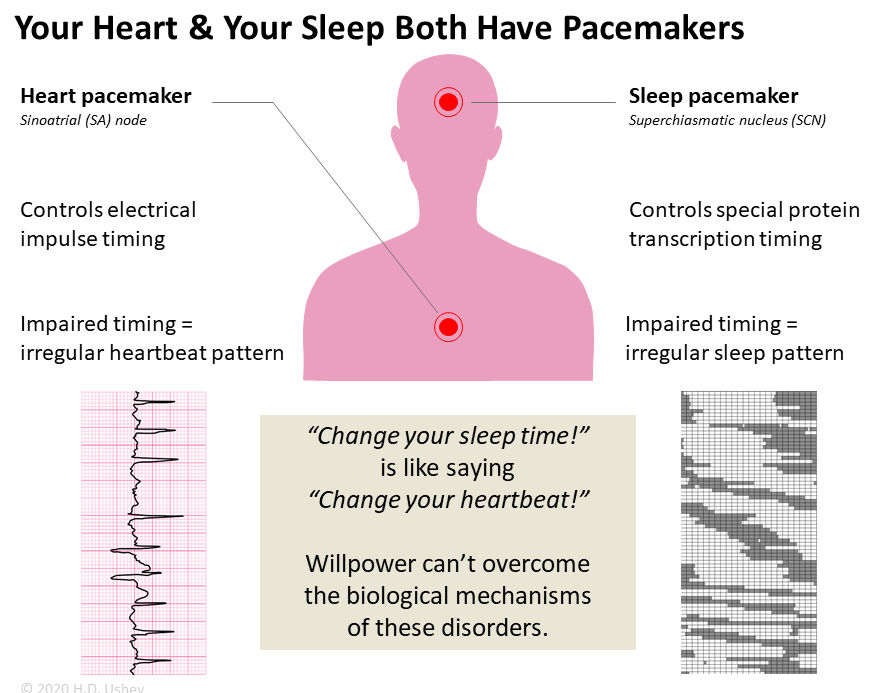 Graphic courtesy of H. D. Ushev, posted with permission.
Graphic courtesy of H. D. Ushev, posted with permission.
A larger version of this graphic has a permanent home at
https://www.circadiansleepdisorders.org/info/sleepheartgraphic.php
Aug 2020
"Not surprisingly, during the pandemic, without the need to get up and go to school at a set time, most teenagers went to sleep about a half-hour later than before COVID.... Sixth graders went to sleep at a median time of 10 p.m., seventh and eighth graders at 11 p.m., ninth and tenth graders at midnight, and eleventh and twelfth graders at 12:30 a.m...
"More surprisingly is that without the need to wake up at a specific time, almost all of the teenagers in the survey woke up at 9 a.m. – giving middle schoolers nine hours of sleep and high schoolers eight hours."
Quoted from Teens Might Finally Get Enough Sleep with 9 a.m. LAUSD Start Time in (L.A.) Spectrum News, Aug 20, 2020.
Sept 2020
Circadian Sleep Disorders Network will be holding elections for its Board of Directors, and is seeking some new faces. Requirements are described in www.circadiansleepdisorders.org/docs/ReqDir.php. Meetings are held by online forum, so you can log in at any time of day to read what's been posted and post your replies. Meetings do continue for two months or more, though often not very actively.
If you're interested, please let us know soon (latest Nov 10), following the instructions at the end of the above document. Directors start serving January 15, 2021. Terms generally run for two years.
We are also often looking for other volunteers willing to help. These can be board members but do not have to be. If you're interested in volunteering, please let us know.
Aug 2020
We have been asked to post this information:
Rare Diagnostics is an online rare disease-specific symptom checker for undiagnosed patients, which they can access 100% free of charge. This provides patients with personalized information about relevant diseases and connects them to online communities of patients with the same symptoms.
Rare Diagnostics believes that connecting undiagnosed patients with patient communities is extremely valuable throughout their diagnostic process. They also realize that patients may have difficulty finding the relevant patient organizations, and Rare Diagnostics could be a solution for this.
They are looking to increase the diagnostic accuracy of their software, and to accomplish this they have built an online form for diagnosed rare disease patients to share their experiences.
They have assured us that the data they collect will be anonymized. However, Circadian Sleep Disorders Network cannot independently verify the security of your information.
You can learn more about their effort, and participate in their survey, at
www.rarediagnostics.com.
June 2020
 Alexandra Wharton, CSD-N Board Member and Social Media Liaison, presented a poster about circadian rhythm disorders at the Society for Research on Biological Rhythms (SRBR) Biennial Meeting in June. SRBR is dedicated to advancing rigorous, peer-reviewed science and policies related to sleep and circadian biology.
Alexandra Wharton, CSD-N Board Member and Social Media Liaison, presented a poster about circadian rhythm disorders at the Society for Research on Biological Rhythms (SRBR) Biennial Meeting in June. SRBR is dedicated to advancing rigorous, peer-reviewed science and policies related to sleep and circadian biology.
Attended by 700 chronobiologists and industry experts from 40 countries, the virtual conference covered the latest research about the mechanisms and functions underlying the entrainment and expression of biological rhythms. Session topics included sleep-wake cycles, hormonal and metabolic rhythms, molecular basis of circadian timing and the identification of genes underlying rhythmicity.
During CSD-N's poster session and Q&A, Alexandra outlined what Delayed Sleep Phase Disorder and Non-24 are, highlighted CSD-N's patient-powered survey and explained that DSPD has high co-morbidity with ADHD and other mental health conditions.
She discussed the challenges Circadian Rhythm Disorder (CRD) sufferers experience including lack of proper diagnosis, treatment and accommodations at school and work. She stressed that genetic and biomarker discoveries are critical for CRD patient advocacy as they highlight the physiological differences in people with these disorders, compared with typical sleepers.
June 2020
 Many thanks to Susan Plawsky for representing the circadian disordered community on the (U.S.) NIH Sleep Disorders Research Advisory Board (SDRAB) for the past four years. Thursday, June 11, was her last meeting as patient representative on that board. Two other members of our community have applied for the vacant slot.
Many thanks to Susan Plawsky for representing the circadian disordered community on the (U.S.) NIH Sleep Disorders Research Advisory Board (SDRAB) for the past four years. Thursday, June 11, was her last meeting as patient representative on that board. Two other members of our community have applied for the vacant slot.
The SDRAB is charged with preparing the Sleep Disorders Research Plan. They have been working on creating this plan for the past four years, and it is currently waiting on review by the various institutes within NIH and other government departments before being released.
The meeting was of course virtual, in these pandemic times. Among the attendees, in addition to Susan, were CSD-N president Peter Mansbach, board member Alexandra Wharton, and member Alexandra Escalera. There were talks on hypersomnia/narcolepsy by Dr Thomas E Scammell and on lighting (in regard to sleep and circadian rhythms) by Dr Mariana G Figueiro. Peter asked Dr Scammell about overlap between DSPD and narcolepsy, but Dr Scammell has not seen this in his practice. Alexandra Escalera also spoke about her struggles as a DSPD patient.
May 2020
 CSD-N has opened an account on Instagram. Thanks to our social media director, Alexandra Wharton, for posting there and on our other sites: Facebook, LinkedIn, and Twitter.
CSD-N has opened an account on Instagram. Thanks to our social media director, Alexandra Wharton, for posting there and on our other sites: Facebook, LinkedIn, and Twitter.
Apr 2020
As previously described, SRS/AASM (Sleep Research Society/American Academy of Sleep Medicine) and SRBR (Society for Research on Biological Rhythms) are preparing a White Paper on needed research in circadian rhythms, and invited CSD-N to provide input from the patient perspective. We did so last June, in our Needed Research document.
In March we received a draft of the White Paper, and again James Fadden, Peter Mansbach, and Susan Plawsky sent our comments and suggested revisions to them. The White Paper has been further edited, was approved by the SRS board, and has been submitted to the journal SLEEP.
Mar 2020
We've updated N24calc, the web app that predicts when you'll be awake if you have Non-24 with a constant day length. The new version uses 12-hour input if that's what your computer's locale is set to, or 24-hour time if it's set to that. It fixes a bug in the previous version in case your "today" started before midnight but it's now after. And adds a notification when it switches to daylight saving time (also depends on your locale). It assumes you're in your awake period when you're using it. Let us know of any problems.
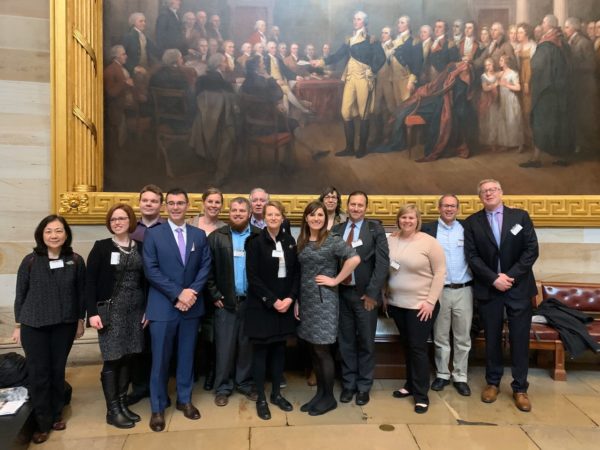 Feb 2020
Feb 2020
On Monday, Feb. 9, 2020, Project Sleep and the Sleep Research Society co-hosted an Advocacy Day on Capitol Hill bringing together patient advocates and sleep researchers to urge Congress to support critical sleep research and awareness efforts. CSD-N board member Jason Myatt (third from left) participated in support of circadian rhythm sleep disorders research. Dr Phyllis Zee (far left), a member of our Medical Advisory Board, also participated. Thanks to all who helped.
Jan 2020
The Board of Directors of Circadian Sleep Disorders Network has elected its officers for 2020 - 2021:
Many thanks to our outgoing secretary, Jen Heller Meservey, for her service.
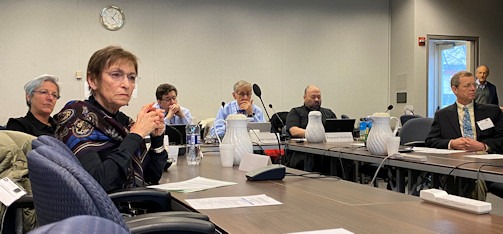 Jan 2020
Jan 2020
The Sleep Disorders Research Advisory Board (SDRAB) of the NIH (U.S. National Institutes of Health) met on Jan 6 and 7 to work on their Sleep Disorders Research Plan. Susan Plawsky (not pictured), our circadian rhythm disorders (CRD) patient representative, attended both days. She plays an important role in calling attention to places where CRDs are likely to be overlooked.
Our president, Peter Mansbach, vice president James Fadden, and member Alexandra Escalera also attended and made brief statements Jan 6 on behalf of CRD patients during the public comment period. Here are Peter's remarks:
Hi. I'm Peter Mansbach, and I'm President of Circadian Sleep Disorders Network.Those of us with Delayed Sleep Phase Disorder or Non-24-Hour Sleep-Wake Disorder suffer. Some of us sleep when our bodies tell us to sleep. We give up good careers to do so, and struggle to earn a living on our odd schedules. And we're still often tired. Others force themselves to be up for the workday, and become sleep deprived, year after year, with all the health issues that eventually result. We desperately need solutions.
Yet this is the current state of research on Circadian Rhythm Sleep Disorders:
This is why we're here. Our current representative, Susan Plawsky's term ends in June. We hope someone else from our circadian-disordered community will be appointed to this Board. Two that I know of have applied.
- Researchers do not even agree on how to define circadian rhythm disorders.
- We do not know how many people have these disorders.
- We do not know what the underlying causes are.
- We do not have a quick way to diagnose these disorders.
- We do not have good treatments; what we do have are largely ineffective.
- What little we do know often isn't implemented by clinicians.
- The public, and even many in the medical community, do not even believe these are real disorders. And they certainly do not understand their severity.
 Jan 2020
Jan 2020
The Society for Research on Biological Rhythms (SRBR) is an international society that promotes the advancement and dissemination of research on all aspects of biological rhythms.
Recently, CSD-N was invited to provide input about circadian rhythm disorders to SRBR's advocacy program. As a result, SRBR.org launched three new website pages: Circadian Rhythm Disorders describing DSPD, ASPD, and Non-24; Awareness & Support with tips on living with a CRD; and Get Involved, which encourages people to share their story, join CSD-N and contribute to our survey.
Thanks to SRBR Public Outreach Committee members Laura Kervezee, Ph.D. and Louise Ince, Ph.D., and CSD-N Board Member Alexandra Wharton for contributing to the content.
Last summer CSD-N prepared recommendations on Needed Research which we submitted for inclusion in a White Paper on needed research for circadian rhythms. The White Paper is being prepared by SRBR together with AASM (American Academy of Sleep Medicine) and SRS (Sleep Research Society). The White Paper is still under development.
Archived News 2019
Archived News 2018
Archived News 2017
Archived News 2016
Archived News 2015
Archived News 2014
Archived News 2013
Archived News 2011 - 2012 (incomplete)